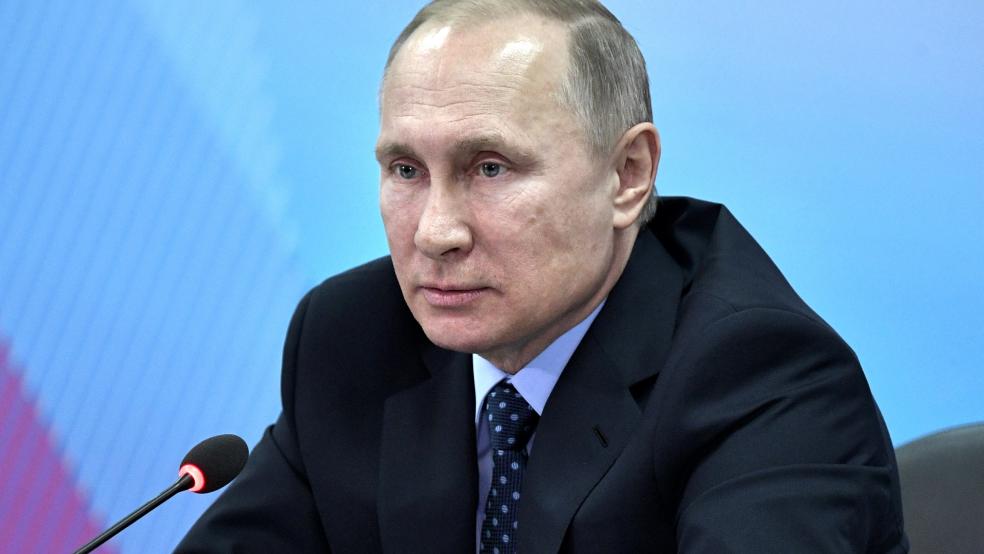The Trump administration probably could have done without any more bombshell revelations this week, trapped as it is in a struggle to pass the House attempt to repeal the Affordable Care Act even as it deals with the news that the Federal Bureau of Investigation is looking into whether the president’s campaign advisers colluded with Russian intelligence agencies during the election. But the Associated Press apparently missed the memo.
Early Wednesday morning, the newswire published an explosive story alleging that former Trump campaign chairman Paul Manafort, already known to have done very well-compensated work for the Russia-friendly former leader of Ukraine, had made millions advising a close associate of Russian President Vladimir Putin on public relations strategies within the United States aimed at boosting the image of the Kremlin.
Related: A Politically Damaged Trump Will Try to Rally GOP Behind AHCA
In 2005 a memo obtained by the AP, Manafort lays out a strategy that, “can greatly benefit the Putin Government if employed at the correct levels with the appropriate commitment to success.” The plan he had drawn up, Manafort continued, “will be offering a great service that can re-focus, both internally and externally, the policies of the Putin government.”
The AP report outlines a years-long relationship between Manafort and Oleg Deripaska, a billionaire and Putin confidant considered a powerful, behind-the-scenes figures in Moscow. In a statement to the AP, Manafort denied that he had worked on behalf of Putin’s interests, despite the plain language of the memo.
“I worked with Oleg Deripaska almost a decade ago representing him on business and personal matters in countries where he had investments,” Manafort said. “My work for Mr. Deripaska did not involve representing Russian political interests.”
In general, there is nothing illegal or necessarily improper about an American citizen advising foreign governments or even working on their behalf in Washington. However, the Manafort memo represents a special case on multiple levels.
Related: It’s Easy to See Where the Trump-Russia Investigation Is Headed
First of all, Manafort is already suspected of having worked for foreign governments in the past, including Ukraine’s Russia-backed former president Viktor Yanukovych, without making the disclosures required under the Foreign Agents Registration Act. Revelations about his work for Ukraine led to his departure from the Trump campaign, which he ran from March to August of 2016, a period that included the crucial run-up to the Republican National Convention.
Second, he has adamantly denied working on behalf of Russian interests in the past. The AP’s reporting, which uncovered both the memo written for Deripaska and records indicating that Manafort was paid tens of millions of dollars by the oligarch, now casts serious doubt on that claim.
Most importantly for the Trump administration, though, is that fact the report comes out less than 48 hours after FBI Director James Comey took the highly unusual step of revealing that his agency is investigating not only the widely accepted accusation that Russia interfered in the 2016 presidential election but also the possibility that members of Trump’s campaign team colluded with Russian intelligence agents in that effort.
In 2015, computer hackers broke into systems at the Democratic National Committee and into email accounts belonging to close associates of Hillary Clinton, who would go on to win the Democratic presidential nomination. Data from those hacks was later released in an obvious effort to damage Clinton during the following year’s election.
Related: Why Spending $1 Trillion a Year on Defense Won’t Make Us Safer
Last summer Roger Stone, a Republican political operative and longtime Trump associate made multiple public statements indicating that he had advance knowledge of the information that was going to be released. High ranking members of the Trump administration, including former National Security Adviser Michael Flynn and Attorney General Jeff Sessions, have faced criticism for failing to disclose contacts with Russian ambassador Sergey Kislyakov prior to the new administration taking office.
The allegations that Trump’s campaign was somehow complicit in the Russian hacking effort has become a major distraction to an administration already overburdened with them as it struggles through its first 100 days in office. The AP’s new revelations about Manafort will only amplify them.




